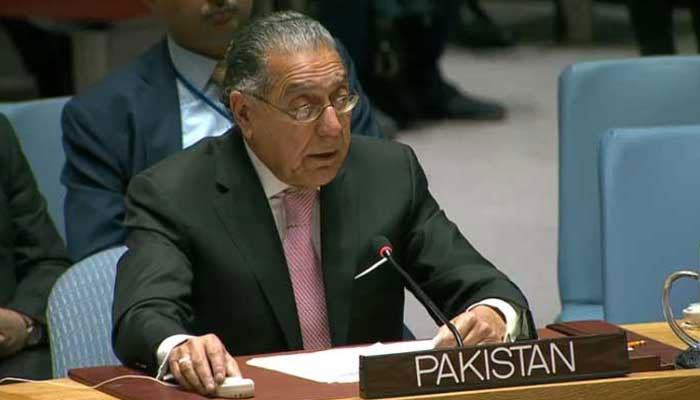Pakistan urges UN to get IIOJ&K detainees released
ISLAMABAD: Pakistan has urged the United Nations (UN) to get released immediately all detainees in Indian illegally Occupied Jammu and Kashmir (IIOJ&K) under the Public Safety Act.
Pakistan has called for the release of all women, elderly people, pre-trial and under-trial detainees on bail (including political prisoners and those detained from the civil society); any convicted political prisoners on parole, especially ones held in jails away from the occupied area; and people illegally detained or held in police lockups, joint interrogation centres, and house arrests. The call has been made by Pakistan in the UN in view of the prevailing COVID-19 crisis in India, and the deteriorating humanitarian situation in IIOJ&K.
In a letter to UN Secretary General Antonio Guterres, Pakistan’s permanent representative at the UN Ambassador Munir Akram conveyed concerns of his foreign minister on the recent demise of a senior political leader and Chairman of Tehreek-e-Hurriyat Jammu and Kashmir Ashraf Sehrai in the Indian custody. “Being a leading political figure from IIOJK, Ashraf Sehrai spent his life struggling for the legitimate right of self-determination of Kashmiris and suffered persecution at the hands of Indian occupying forces. He was arrested last year on fabricated charges under the draconian Public Safety Act. He had several health problems and underwent cataract surgery a few months before his arrest.”
Munir Akram stated the arrest was the worst manifestation of Indian state oppression. Despite repeated humanitarian calls for release, Sehrai remained incarcerated in an Indian jail under poor conditions and the prevailing COVID-19 crisis, ultimately leading to his death. Apart from tribulations of incarceration and other kind of abuse and torture, the letter also conveyed concerns over the conditions of the detention facilities in IIOJ&K and India, calling them as often “overcrowded, in some cases dangerously so”, in unhygienic conditions and where health services are inadequate or even non-existent. Physical distancing and self-isolation in such conditions are practically impossible. As the COVID-19 situation in India worsens, Munir Akram expressed his concerns over the health and safety of thousands of other incarcerated Kashmiri leaders and innocent Kashmiris languishing in different jails at undisclosed locations.
“While the government of India has made perfunctory announcements about the release of several detainees as a result of the COVID-19 pandemic, most Kashmiri political prisoners remain incarcerated in different jails,” the letter stated. The letter sought attention of the UNSG to the decision of “a committee formed by the Indian government, which was mandated to decongest jails in the wake of COVID-19 to not release those booked under the Public Safety Act, or militancy-related convicts, on any parole”. India provides “an excuse for continued incarceration of leading Kashmiri political leaders including Aasiya Andrabi, Yasin Malik, Shabbir Ahmed Shah, Advocate Shahid-ul-Islam, Altaf Ahmed Shah, Naeem Ahmed Khan, Ayaz Akbar, Peer Saifullah, Raja Merajuddin Kalwal, Syed Shahid Yousuf, Shakeel Ahmed, Farooq Ahmed Dar, Fehmeeda Sofi, Nahida Nasreen, Zahoor Ahmed and others. Some remain under house arrest including Syed Ali Shah Geelani and Mirwaiz Umar Farooq”.
By detaining people for such lengthy periods, without allowing them to effectively challenge their detention in a court of law, India is clearly in violation of its international human rights obligations, Security Council resolutions, Geneva Conventions and international humanitarian law, Munir remarked in his letter. He recalled that since the outbreak of the pandemic, the SG and the HCHR, Michele Bachelet, have repeatedly called for a human rights-based approach to prevent COVID-19 virus from rampaging through places of detention.
-
 Sterling K. Brown's Wife Ryan Michelle Bathe Reveals Initial Hesitation Before Taking On New Role
Sterling K. Brown's Wife Ryan Michelle Bathe Reveals Initial Hesitation Before Taking On New Role -
 BAFTA Film Awards Winners: Complete List Of Winners Updating
BAFTA Film Awards Winners: Complete List Of Winners Updating -
 Millie Bobby Brown On Her Desire To Have A Big Brood With Husband Jake Bongiovi
Millie Bobby Brown On Her Desire To Have A Big Brood With Husband Jake Bongiovi -
 Biographer Exposes Aftermath Of Meghan Markle’s Emotional Breakdown
Biographer Exposes Aftermath Of Meghan Markle’s Emotional Breakdown -
 Backstreet Boys Admit Aging Changed Everything Before Shows
Backstreet Boys Admit Aging Changed Everything Before Shows -
 Ryan Coogler Makes Rare Statements About His Impact On 'Black Cinema'
Ryan Coogler Makes Rare Statements About His Impact On 'Black Cinema' -
 Rising Energy Costs Put UK Manufacturing Competitiveness At Risk, Industry Groups Warn
Rising Energy Costs Put UK Manufacturing Competitiveness At Risk, Industry Groups Warn -
 Kate Middleton Makes Glitzy Return To BAFTAs After Cancer Diagnosis
Kate Middleton Makes Glitzy Return To BAFTAs After Cancer Diagnosis -
 NFL Star Rondale Moore Dies Aged 25, Minnesota Vikings Pay Tribute
NFL Star Rondale Moore Dies Aged 25, Minnesota Vikings Pay Tribute -
 Kim Kardashian Makes Huge Career Move Weeks After Going Public With Lewis Hamilton
Kim Kardashian Makes Huge Career Move Weeks After Going Public With Lewis Hamilton -
 Shia LaBeouf Draws Attention For Sweet Reason After Spending Time In Jail Over Brawl Incident Amid Mardi Gras Bash
Shia LaBeouf Draws Attention For Sweet Reason After Spending Time In Jail Over Brawl Incident Amid Mardi Gras Bash -
 Princess Eugenie, Beatrice Receive Strong Warning After Andrew Arrest: 'Zero Tolerance'
Princess Eugenie, Beatrice Receive Strong Warning After Andrew Arrest: 'Zero Tolerance' -
 Rihanna 38th Birthday Detail Breaks The Internet, Featuring Unexpected Huge Item
Rihanna 38th Birthday Detail Breaks The Internet, Featuring Unexpected Huge Item -
 Liza Minnelli Recalls Rare Backstage Memory With Mum Judy Garland In New Memoir
Liza Minnelli Recalls Rare Backstage Memory With Mum Judy Garland In New Memoir -
 Armed Intruder Shot Dead At Trump's Mar-a-Lago Residence: US Secret Service
Armed Intruder Shot Dead At Trump's Mar-a-Lago Residence: US Secret Service -
 Total Lunar Eclipse: What You Need To Know And Where To Watch
Total Lunar Eclipse: What You Need To Know And Where To Watch




